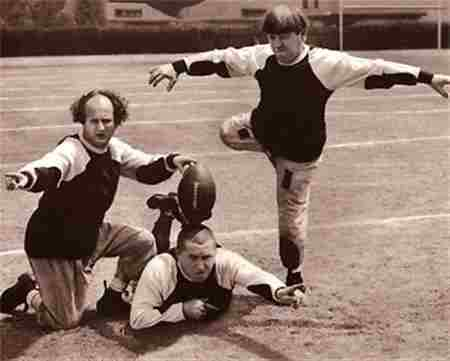 David Steverson, writing in Leadership journal, says sometimes the church has a language all its own. Insiders understand it for the most part, but outsiders are almost sure to miss the subtle nuances of Churchese. Here’s a brief glossary of common terms and phrases:
“We’ll sing only the first verse of our closing hymn,” really means, “I preached too long!”
“This is the best book I’ve read on the subject,” really means, “This is the only book I’ve read on the subject!”
“It’s time for Vacation Bible School again,” really means, “Start saving those panty-hose containers, popsicle sticks, egg cartons and baby food jars.”
“Everybody is saying . . .” really means, “My wife told me . . .”
“Our church is close–knit,” really means, “We haven’t had a new member in five years!”
When the preacher said, “In conclusion,” for the fourth time, one little boy asked his friend, “What does that mean?” The other boy said, “It means absolutely nothing!”
Another facet of Churchese language is all those words that no one outside the church will ever understand. For example, what do NIV, NASB, RSV and even KJV mean to an outsider? Could it be, “Never Inside the Vestry” or “Not A Serious Bible” or . . .?
And how about those signs at the football games saying, “John 3:16”? To the uninitiated, it could look like a message to the friend who arrived late, “John, we’re sitting in Section 3, Row 16” instead of a Bible book, chapter and verse.
If un–churched guests comes to hear a sermon, what do they make of propitiation, expiation, consubstantiation, or even grace? For that matter, a lot of church people wouldn’t understand those terms either.
We dare not sacrifice understanding on the altar of Churchese. On the other hand, we must never sacrifice truth on the altar of “relevance” either. God wants to meet people where we are, but He always wants us to rise above simply “where we are.”
Someone has said, “God loves us just the way we are, but He loves us too much to leave us just the way we are.” And if church people expect others to change (okay, if we’re to change too), then we’ve got to stop speaking Churchese and start talking so people can understand the beautiful truths of Scripture.
 Football season is almost here. Every year I look forward to it with anticipation, but by the end of the season, I’m sick and tired of it. With that thought in mind, it makes sense to offer a dozen good reasons to stay home when the gridiron grunts come out to play.
12. Every time I go to a game, they are always after my hard–earned money.
11. The people who sit next to me aren’t very
friendly.
10. The seats are too hard and uncomfortable, and the temperature is too low / high (take your pick).
9. The coach never comes to visit me after the game.
8. The referee makes decisions that I simply cannot agree with.
7. I always see hypocrites there. They either criticize what others are wearing or else talk about me behind my back.
6. Sometimes the games go into overtime, or move a little too slowly, and I’m late getting home.
5. The band keeps playing songs that are unfamiliar to me.
4. The games are scheduled when I want to do other things.
3. My parents took me to too many football games when I was growing up, and I am now very turned off by it all.
2. I once read a book about football, and now I know more about the game than the coaches do.
1. I don’t want to take my kids to football games, because I want them to choose for themselves what they believe.
With only minor modifications (called "audibles" in football), all the above could be what people say about why they don’t go to church.
As someone once said to me, “Don’t gripe about the church. If it was perfect, they wouldn’t let you join.”
Or perhaps the king of all observations: “I don’t know why people change churches. What difference does it make which church they stay home from?”
 Several fishermen were relaxing in a Scottish seaside inn after a long day at sea. As a serving maid walked past the table with a pot of tea, one of the men made a sweeping gesture to describe the size of the fish that got away. His waving hand sent the teapot crashing against the white wall, where it left an ugly, brown stain.
Standing nearby the innkeeper surveyed the damage. “That stain will never come out,” he said in dismay. “The whole wall will have to be repainted.”
“Perhaps not.”All eyes turned to the stranger who had just spoken. “What do you mean?” asked the innkeeper.
“Let me work with the stain,” said the stranger, standing up from his table in the corner.“If my work meets your approval, you won’t need to repaint.”
He went to the stained wall. Opening a box, he withdrew pencils, brushes and some glass jars of linseed oil and pigments. He began to sketch lines around the stain and fill it in here and there with dabs of color and swatches of shading. Soon a picture began to emerge. The random splotches of tea were turned into a majestic stag with a magnificent rack of antlers. At the bottom, the man inscribed his signature. Then he paid his bill and
left.
The innkeeper was stunned when he examined the wall. “Do you know who that man was?” he asked in amazement. “He signed this wall mural ‘E.H. Landseer!’ ” Indeed, they had been visited by the most famous English wildlife artist of the era. And the master had turned a mess into a work of art.
God the Master Painter wants to take the stains and messes and disappointments of our lives and not remove them, but rather transform them into a thing of beauty. He has the ability to do that, but we have to let him. Change isn’t always easy, but it’s usually very worthwhile.
In 2 Corinthians 5:17, the Apostle Paul, a man with some ugly stains on his wall, wrote, “Therefore, if anyone is in Christ, he is a new creation; the old has gone, the new has come!”
How wonderful that our Savior is God of Plan ‘B’. When I messed up His Plan ‘A’ for my life, a long, long time ago, He began sketching out the next best thing for me. He has taken so many ugly stains on the walls of my life and made them into works of art. In fact, my life could be a gallery of grace
and beauty He made from ugly stains splashed onto the walls. If there is
anything—anything at all—beautiful about my life, it’s only because Jesus Christ
remade something ugly, something hideous, into His lovely
masterpiece.
Joseph Lahey was like lots of fourth graders. He hated it when he would have to take off his clothes for the dreaded school physical. Joseph managed to hide a curvature of the spine quite well with his clothing. But when the clothes came off, he was obviously and—to himself—hideously deformed.
Sitting in the doctor’s waiting room with all the other boys to take his school physical, carefully wrapped in a robe, he listened apprehensively as they joked about what the doctor would do. And he died by inches inside.
Eventually it was Joseph’s turn. And he heard the dreaded words, “Okay, off with the robe.”Standing naked, Joseph wanted to shrivel away to nothing.
Immediately the doctor put down the chart. Gently he took the lad’s face in his hands and looked deeply into his eyes. “Do you believe in God?” he asked.
“I was astonished,” Lahey said years later, “but I told the truth. ‘Yes, sir,’ I said.”
“That’s good,” the doctor responded, “because there is nothing we can do in this world alone. The more faith we have in him, the greater the faith we have in ourselves.”
The child felt strangely warmed with the intensity of the doctor’s faith and the kindly gentleness in his touch.
The physician turned away and sat at his desk. He wrote something on the chart, then left the room, the chart still lying on the desk.
“I wonder what it really says about me,” Joseph thought, stepping toward the chart. “I wondered what he wrote about my deformity.” To the child’s surprise, the doctor’s words were brief and simple: “Has an unusually well–shaped head.”
“I read the words again,” Lahey wrote years later in Guideposts magazine. “There was no mistake, that was what he had actually written!
“I know that my head is no better shaped than anyone else’s. But I got the message: focus on the best, not the worst, in any situation. Believe that with God’s help a person can learn to live with any handicap.
Almost everyone is handicapped in some way. But God is not handicapped by our handicaps, only by our attitudes toward them. And he loves us more than words can tell!
Our handicaps, real or imagined, can have a positive result, by showing that God doesn’t need us to be strong, capable, beautiful, even smart. All he needs is for a person to trust him, accept the challenges one faces in life, and go obediently in the direction God sends. Perhaps that’s exactly what Paul had in mind when he wrote Philippians 4:13, “I can do all things through him who strengthens me.”
|





 RSS Feed
RSS Feed